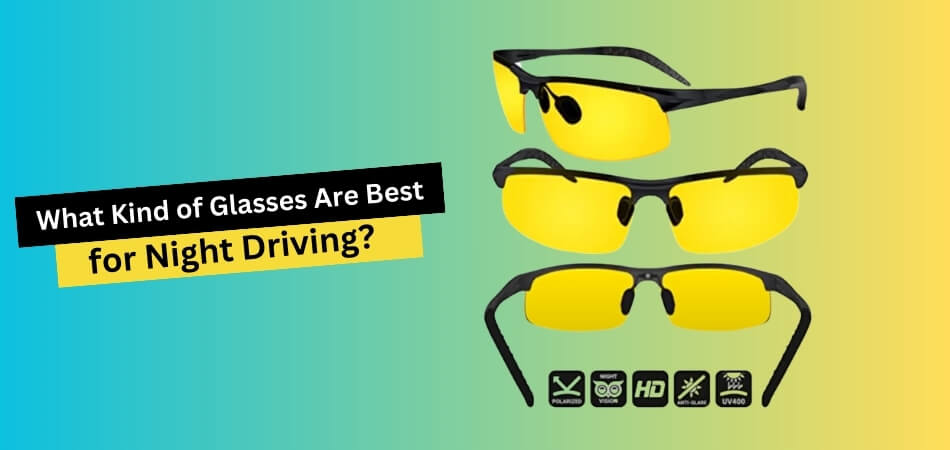Nighttime driving can be tricky, especially with blinding headlights and reduced visibility. You might be wondering, “what kind of glasses are best for night driving?” Well, we've got the answers you need.
The top choices for night driving glasses are those with yellow-tinted lenses and an anti-reflective coating. These work together to cut down glare, reduce halos around lights, and improve contrast, making it easier to see in the dark.
Additionally, blue light-filtering glasses can be a game-changer. They help in blocking the harsh blue light from modern headlights, making your night drives more comfortable and safe.
In this article, we'll break down these options and provide you with simple, actionable insights to choose the best glasses for your nighttime adventures. So, let's get started and shed some light on what glasses work best for night driving.
Brief Overview of Night Driving Glasses
Night driving glasses are specialized eyewear designed to enhance visibility and reduce glare when driving in low-light conditions. These glasses often feature yellow-tinted lenses, which help improve contrast and reduce the dazzling effects of headlights and street lights at night. Additionally, they may have anti-reflective coatings that minimize halos and reflections for a safer driving experience.

Blue light-filtering glasses are another option for night driving. They effectively block the intense blue light emitted by modern headlights, reducing eye strain and enhancing visual clarity during nocturnal journeys. These glasses can be particularly helpful for individuals sensitive to bright lights or those seeking a more comfortable and safer driving experience after dark.
When choosing night driving glasses, consider factors like prescription needs, fit, and overall lens quality. Keep in mind that while night driving glasses can significantly improve your visibility and comfort on the road at night, it's essential to prioritize safe driving practices, such as maintaining a safe following distance, using your high beams appropriately, and staying alert to changing road conditions, to ensure a secure nighttime journey.
Challenges Of Nighttime Driving
Nighttime driving presents several significant challenges for drivers, which can impact safety and overall driving experience. These challenges include reduced visibility, glare from headlights, increased fatigue, and a higher risk of accidents.
Reduced Visibility:
Visibility is significantly reduced at night due to the absence of natural daylight, making it harder to spot hazards, road signs, and pedestrians in the darkness. Fog, rain, or snow can exacerbate this issue.
Glare from Headlights:
The glare from oncoming headlights can be blinding, causing temporary vision impairment and making it challenging to focus on the road ahead. Additionally, improperly aimed or overly bright headlights contribute to this problem.
Increased Risk of Fatigue:
Driving at night can be more mentally taxing, leading to increased driver fatigue. This can affect reaction times and overall alertness. Longer night time drives, such as road trips, can be particularly draining.
Impaired Depth Perception:
The lack of natural light can impair depth perception, making it difficult to judge distances accurately, especially when passing other vehicles. Poorly lit roads and inadequate road markings further compound this issue.
Wildlife Encounters:
Nocturnal animals are more active at night, increasing the risk of unexpected encounters on the road, which can result in collisions and damage. This is especially prevalent in rural areas and near wooded regions.
Navigating these challenges requires both attentiveness and the right tools, such as night driving glasses, to enhance visibility and reduce glare, ultimately promoting safer nighttime driving experiences.
What Kind of Glasses Are Best for Night Driving?
Nighttime driving can be a daunting challenge, especially when confronted with blinding headlights and reduced visibility. You may have asked yourself, “what kind of glasses are best for night driving?” In this guide, we'll explore the solutions to this nighttime driving conundrum.

Yellow-Tinted Lenses for Enhanced Contrast:
Yellow-tinted lenses are excellent for night driving, as they improve contrast, making it easier to distinguish objects in low-light conditions. They reduce glare and minimize the blinding effects of headlights.
Anti-Reflective Coatings to Combat Glare:
Pairing yellow-tinted lenses with anti-reflective coatings is a winning combination. These coatings minimize halos around lights and reflections on the lenses, providing a clearer, more comfortable night-driving experience.
Blue Light-Filtering Glasses for Glare Reduction:
Blue light-filtering glasses can be beneficial for those seeking to reduce the glare of oncoming headlights. They selectively block intense blue light from modern headlights, reducing eye strain and discomfort.
Prescription Night Driving Glasses:
For those with vision issues, prescription night driving glasses are available. These combine vision correction with the benefits of anti-glare coatings and tinted lenses for a customized solution.
Fit and Comfort:
Comfort is key for long night drives. Ensure the glasses fit well and don't cause discomfort, pressure points, or slipping, as these factors can affect your concentration. Clearview Glasses, known for their comfort and clarity, are a notable option in this category.
Budget Considerations and Quality:
While budget is a consideration, prioritize quality to ensure the glasses effectively serve their purpose. Look for reputable brands and products that meet safety standards. Seeking advice from an eye care professional can help you make an informed choice tailored to your specific needs.
Common Misconceptions About Night Driving Glasses
Night driving glasses are meant to make nighttime driving safer and more comfortable, but there are common misunderstandings about them. Let's clear up these misconceptions and learn how to use them effectively.

- Only for the Elderly: Night driving glasses benefit drivers of all ages, not just older individuals. They enhance visibility for everyone, particularly in challenging low-light conditions.
- Dark Lenses for Night: Contrary to belief, night driving glasses usually have yellow or clear lenses, which reduce glare without darkening vision. This ensures you can see clearly without compromising safety.
- Substitute for Safe Practices: Night driving glasses improve visibility but don't replace safe driving habits like staying alert and maintaining proper following distances. They complement responsible driving practices.
- Expensive Equals Effective: Pricey glasses don't necessarily offer better performance. Quality and suitability matter more than cost. Look for well-designed, reasonably priced options that suit your needs.
- Prescription-Only: Night driving glasses are available in non-prescription versions, providing benefits for those with perfect vision too. You don't need a prescription to enjoy reduced glare and improved night driving comfort.
- Limited Use for Professionals: Night driving glasses aren't only for truckers or night shift workers; they benefit all drivers, including those navigating nighttime city streets.
- Exclusively for Nighttime: While designed for night driving, these glasses can also help in low-light conditions like dawn and dusk. They enhance visibility during transitional periods.
- Guaranteed Zero Glare: They reduce glare but can't eliminate it entirely; responsible use of high beams by others is vital. Night driving glasses mitigate, not eliminate, glare.
- No Need for Regular Glasses: If you wear prescription glasses, consider options that fit over or clip onto your existing frames. This way, you can enjoy the benefits without compromising your vision correction.
- One-Size-Fits-All: The best night driving glasses vary by individual preference; what works for one may not suit another. Explore different styles and features to find the perfect fit for your needs.
Tips for Choosing the Best Night Driving Glasses
When it comes to driving at night, the right choice of night driving glasses can significantly enhance safety and visibility. The challenge lies in selecting the perfect pair that suits your needs, and that's where these tips come in.
Consider Your Prescription Needs:
If you have vision correction needs, opt for night driving glasses that can be customized with your prescription for optimal clarity and comfort. Consult an eye care professional to determine the right prescription strength.
Focus on Fit and Comfort:
Ensure that the glasses fit comfortably on your face and don't cause pressure points or slip while driving. A secure fit is crucial for extended night drives, so consider adjustable features for added comfort.
Evaluate Lens Quality and Coatings:
Assess the quality of the lenses, looking for options that include anti-reflective coatings to reduce glare and enhance clarity. High-quality lenses can significantly impact your night driving experience.
Set a Budget and Prioritize Quality:
While cost is a consideration, prioritize quality over price. Reliable, well-designed night driving glasses may be more effective in enhancing visibility and reducing glare, ultimately contributing to safer night driving.
Seek Professional Advice:
Consult an eye care professional or optometrist for personalized recommendations. They can assess your specific vision needs and suggest the most suitable night driving glasses, whether prescription or non-prescription, based on your unique requirements.
By following these tips and considering your individual needs, you can confidently choose the best night driving glasses to enhance your safety and comfort during nighttime journeys.
Conclusion
Finding the right glasses for safer night driving is a key concern. The top choices, as we've seen, are those with yellow-tinted lenses and anti-reflective coatings, which work together to reduce glare and enhance contrast, making nighttime journeys more secure and comfortable.
Additionally, blue light-filtering glasses are a game-changer, blocking harsh blue light from modern headlights and reducing eye strain during nocturnal drives.
Remember to consider factors like prescription needs, fit, and lens quality when choosing your night driving glasses. And always prioritize safety on the road by maintaining safe following distances and using high beams responsibly.
So, the answer to the question, “what kind of glasses are best for night driving?” lies in these features. Choose wisely, and you'll be on your way to safer and more comfortable nighttime journeys.






